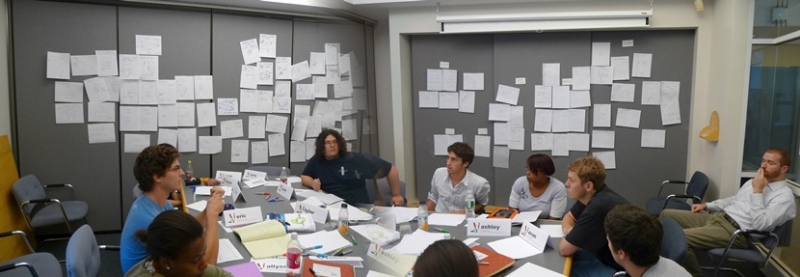
So you’ve just agreed a new web project. All the pitching and negotiations are out of the way, and the ‘real work’ is about to start. But there’s one more thing to do that could decide the success of your project – or at the very least, save a lot of wasted effort and money down the line!
Now is the perfect time to get everyone involved in the project locked in a room (not literally…) to extract information and ideas from them – in a ‘discovery workshop’.
There is no quicker and easier way for an agency to get to know a customer and what they want to achieve from their website.
Discovery workshops allow everyone to meet – possibly for the first time – and lay their cards on the table; what aggravates them about the current website, queries they have about how the project will be run, and most excitingly any ideas for how they want the new site to work.
Everyone is listened to and all comments are captured, so it gives the marketing team a real opportunity to get buy in at this early stage.
Who should be involved?
From the client side, consider who else who may have a stake in the site, including heads of department, the MD, sales guys; anyone who can bring something to the table. Don’t limit attendance to just the marketing team or whoever is tasked with delivering the site.
From the agency side this usually means members of the pitching team, development and creative teams and the project manager who will deliver the site. But it could also be other customers or clients or wider stakeholders, it really depends on the project in hand.
So how does it work?
Website workshop breakdown
The following is a typically activity plan for a web project workshop. These can vary from project to project, but the basic framework remains the same:
- Introduce everyone and communicate purpose of the workshop
- Agree project objectives
- Involve all stakeholders
- Discuss specific needs and objectives
- Define the KPIs for the website/project
- Decide how success will be recorded
- Define the ‘user profiles’
- Determine the target audiences
- Define the user journeys
- What do we want visitors to do on the site?
- Use the MoSCoW (Must, Should, Could, Won’t) method of prioritisation to:
- Generate user stories
- Formulate the ‘features’ that need to be included
- Make sure all activities are achievable within given budget
- Determine roles and responsibilities and next steps
The workshop tends to conclude the research phase of the project. Sometimes additional features are agreed in the workshop which need researching) but the outcomes of this research and workshop are essential to the delivery of the project.
What comes after the discovery workshop?
The discovery workshop enables an agency to challenge the brief and ensure they know as much as they can about the features required and how it should look and feel.
Following the workshop, the agency should produce some or all of the following documents:
- Notes of the meeting
- Web scoping document – detailing everything needed to build the site on a functional level
- Audience personas document – developed to simplify your content creation process by defining an audience’s characteristics
- Functional requirements document – lists the requirements of the website from the perspective of the users, demonstrating the ‘why’ and ‘what’, rather than the technical ‘how
- Site map – a visual plan of the website’s proposed content
- Updated timing plan
- Updated budget
This is where things get exciting for the agency and the client. Using the insights gleaned at the discovery stage, it is time to produce wireframes and designs – and start to see ideas coming to fruition!
So as you can see, this is some of the most valuable work an agency can do with a customer and the resulting deliverables will be critical to the success of the project.
Access can facilitate and manage a workshop on any subject, if you would like to learn more or discuss your requirements drop us a line at [email protected]








